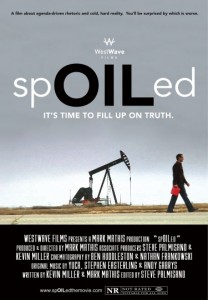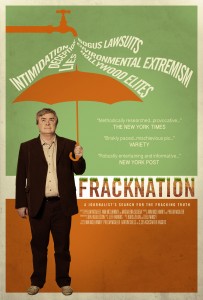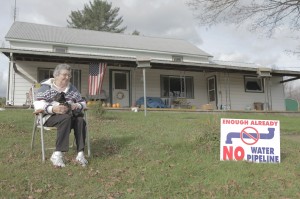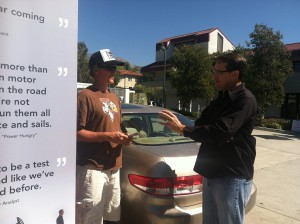By Jesse Mullins
A Case to Be Made
It’s never hard to find an example. Like, for instance, the example that presented itself in the morning’s news, as this report was in progress.
An example of what, you ask? An example of a subtle trashing of the oil and gas industry. Of loaded language. Of bias and slantedness. Sure, the example reads innocent enough. But that’s how the game is played.
This morning’s example was a bright and cheerful media announcement from Amazon. They want you to know that they’ll soon be running their cloud services entirely on clean energy. Here was the headline: “Amazon Commits to 100% Clean Energy for Cloud Services.”
Did you catch that? Clean energy. And we know, from their language, what “clean” energy is not. It is not oil and gas. Not by their reckoning.
We’re all so very used to hearing that kind of pejorative language that we hardly give it a thought any more. That line of propaganda has been drilled into the populace for so many years that most people have come to accept it as a matter of course. Wind and solar are “clean.” Oil and gas are “dirty.”
Setting that thought aside for the moment, we come to the business of powering “cloud services.” It’s a commitment Amazon is making.
So, in other words, if the oil and gas you bring forth with your hard work—if that fuel does the heavy lifting at Amazon—if that fuel heats and cools the bulk of the facilities and drives the engines and gets the workforce to and from the workplace, if it (along with coal) powers most of the electrical circuits and keeps the lights burning, then with all that heavy lifting going on in almost every corner of the Amazon high tech industrial empire, with all of that capacity and even excess at hand, it’s possible then to set aside a server room somewhere and tell the world that that server room, that “cloud,” is powered by clean energy, not dirty energy.
Well, good for Amazon. Good to be so clean.
But what if oil and gas is not content with being disparaged as “not clean,” not content with being reviled as more harmful to the environment than the so-called clean energy sources?
There are some voices out there that are challenging those hostile views and asserting an entirely different, opposite one. And they’re doing it with evidence, with science, with data, and with passion.
These days, oil and gas are in the crosshairs. There always have been industry detractors, but in recent years, oil and gas has been more than just a target. It has been an industry sector that the opposition vilifies, yes, but increasingly that opposition vilifies and draws voters and dollars to its side sheerly by making oil and gas a threat to be opposed. That tactic pays them dividends that can overflow into other political arenas, and into other political agendas they may represent. Support is support. Building constituencies is building constituencies. Making hay is making hay.
If the anti-oil and gas crowd can turn our industry into a cash cow, a means of winning support dollars and followings—followings used to win on issues, even on issues not related to oil and gas matters—then something has gone seriously awry.
Meanwhile, a new breed of oil and gas defenders has been, in the main, far more vocal than has the oil and gas industry itself. We’re seeing a disparity of approaches within our own ranks. How that will shake out remains to be seen.
So the competing strategies have been (1) storm the castle of the opposition, and (2) don’t react to the anti-industry protesting, but meanwhile accentuate your side’s positives.
There may be pros and cons to each strategy.
A Contrast of Approaches
Documentary filmmakers like Phelim McAleer (FrackNation) and Mark Mathis (spOILed and the planned project Fractured) are go-on-the-offensive types. They take the fight to the other side, challenging their allegations and demanding factual evidence. McAleer in particular is aggressive on putting the anti side itself on trial.
PBOG spoke with McAleer recently, seeking feedback about his experiences with FrackNation and his insights into the current controversies. McAleer urged greater industry advocacy from friends of our industry.
“The oil and gas industry has not realized what has come and what’s going to come,” McAleer said. “They don’t realize that this is not a fair fight. They need to lose this thing about jobs. When you don’t attack the green movement for lying, what you’re really doing is saying, ‘Well, we pollute the environment but it’s worth it because of jobs.’
“That’s not the reality.” McAleer contends. “The reality is they don’t pollute the environment. There’s no evidence of it. They actually improve the environment and they bring jobs. The jobs are almost irrelevant. There’s no evidence, there’s no scientific evidence [of pollution]. There’s lot of anecdotes, there’s lots of allegations, there’s lots of lucrative lawsuits from plaintiffs. But no evidence. When you go to the science, there’s no science there that says frac’ing is harmful. They need to get rid of the ‘jobs’ thing. They need to tackle these lies, they need to tackle these greedy plaintiffs and these bogus lawsuits head on, and the ideological people who are opposed to frac’ing head on, and attack them for lying, attack them for exaggerating and attack their hypocrisy as they work on their fossil fuel iPhones and fossil fuel Apple Macs and fossil fuel PCs and fly in their fossil fuel airplanes to protest fossil fuels.
“They need to come out from that angle, not from ‘We bring jobs, jobs, jobs,’ because that just sends out the wrong message. It sends out a wrong message strategically as well as factually, because it’s actually factually wrong. They’re not polluting the environment, and jobs are not the most important thing. Most people don’t want the water polluted and don’t care about jobs if it’s going to mean the water’s polluted. They need to tackle the lies about ‘polluting water’ first.”
Some have contended that the attackers of oil and gas are incited by political forces who are active on a larger front than simply environmental issues. Asked about this contention, McAleer indicated it has validity.
“This is not about frac’ing,” McAleer said. “Frac’ing’s just a little battlefield in an ongoing war on fossil fuels, a war on America, a war on American success and American prosperity because those who are opposed to frac’ing, they don’t mind Venezuela and Russia frac’ing and Chinese frac’ing. No problem with that. It’s only American frac’ing that they don’t like. American frac’ing is the most regulated on the planet. It’s possibly the most regulated industry on the planet. It’s not about frac’ing. It’s not about polluted water because if it was about polluted water the debate would be over yesterday because that’s a very scientific thing to prove.
“How was my water five years ago? How is it now? Has it changed? Has it been polluted? Yes or no? There’s tests you do. If the answer is no, which it is, story’s over. This is not about frac’ing.”
Political Hay-Making
Another contention that some have advanced is that when “climate change” began to falter as a political bandwagon, the green lobby needed to manufacture some other villain to keep its political machinery fueled, and that hydraulic fracturing has been picked as the perfect foil. McAleer was asked about this as well.
“Yes, it’s just another convenient area to attack,” he said. “That’ll keep going. It’s another way to attack—to attack not only the oil and gas industry but also to attack America. Before [filmmaker] Josh Fox made Gasland (the most oft-cited of the anti-oil and gas films] he made a movie attacking American soldiers as rapists and murderers. That’s his opinion. He’s perfectly entitled to it. I’m very appreciative of America as a country that allows him to have that opinion and will protect that opinion. [McAleer is an Irish citizen.] But that’s his opinion. He tried to push that opinion [earlier] through a movie. It didn’t work. The movie died. Then he tried to push the same opinion through Gasland, the documentary, and he succeeded.”
PBOG also spoke with Clint Walker, who is chairman-elect of the Permian Basin Petroleum Association, and in that conversation we shared McAleer’s views that “jobs, jobs, jobs” were not the best tactics for countering industry criticism. Walker, who is general manager of Cudd Energy Services, was not entirely in agreement.
“I try to focus on the positives and not deal with the negatives,” Walker said. “The positive things are that we have put a lot of money into the economy. We have created jobs. We are a big part, not only of this economy, but of the national security of the country. Now, to his point, you have to educate those people. I’m sorry, but when you start trading licks, I mean, somebody’s gonna get bloody. I’ve heard them talk about how you’ve got to get on Twitter and you’ve got to get out there and [fight them on those media fronts] and I just don’t think it’s healthy to be trading insults with someone.”
Walker expressed appreciation for what McAleer and his wife/partner Ann McElhinney have done, and allowed that his own personal views might not be the prevailing or majority view. “Maybe I’m living in a false reality,” he said, “but I go all over the world and I think for the most part people are pretty good. You’ve got some people out there that are just troublemakers and you’ve got people out there that really believe in what they’re doing. The other side, that being the environmentalist side, are people that are against the oil and gas business. They may actually believe that we do some of these things [that oil and gas are accused of], and it’s our job to educate them, to say, ‘Well, no, that’s really not what’s happening.’ I think the public is smart enough to weigh that out and say ‘Well, they’re just troublemakers.’” I’ve heard Ann McElhinney speak and she is very passionate about getting on Twitter and Facebook and getting in these guys’ faces. She makes a good argument, but the majority of our public is not educated about what we do.”
A Spoiled Society
When we turn from Walker and tune in another filmmaker—in this case Mark Mathis—we see the focus swing back to the go-on-the-offensive position.
Mark Mathis, creator of the documentary film spOILed, said he would agree with Phelim McAleer that (Mathis’ words) “the industry should be much more aggressive in beating back the stuff that comes out, the propaganda that’s just simply untrue.
“But they don’t,” Mathis continued, “and there are lot of different reasons why. If you just push back and you look at who these people are, who the oil and gas industry is, what you have is an industry that’s dominated by engineering. These are linear thinking people, technical problem solvers. That’s what their brains are geared to think about and that’s how they work. When you throw in this idea of getting in the public sphere and defending your industry, [the idea of] doing battle with creative people who paint pictures of environmental degradation and doom-and-gloom, they are completely outside their comfort zone.
“This is a core reason why they don’t fight. This has been my observation after being around and analyzing and speaking with people from the industry over the last decade or so. That’s what I’ve seen over and again. It would be like asking an actor to do calculus. An actor might not even try, and this, on the flip side, is what you have with the oil and gas industry. You have the engineering, linear thinkers, problem solvers, and you’re saying to them, now go get on a stage and act. It’s completely outside their world, so they don’t. They just sit back, keep their head down, keep working. Just shake their head, kick the furniture, and keep working.”
So is the best path one of being quietly supportive of what people like McAleer and Mathis are doing? Are oil companies secretly pleased and quietly supportive of these messages? Both McAleer and Mathis have taken pains in the past to distance their efforts from oil companies, especially “Big Oil,” at least where funding is concerned.
Mathis thinks not. “The truth is that they’re scared even when somebody from the outside, somebody like Phelim or myself, gets involved and makes a film that says, ‘Wait a minute, let’s take a closer look at what’s really going on here.’ They will cheer from the sidelines and they’re happy when the product gets made and gets out there, but a lot of these people and companies are nervous to even clap, to even applaud. We saw that with spOILed, where especially the major oil companies wouldn’t even talk about spOILed. It’s the fear factor that’s involved. Feat of the anti-industry. And that’s what people should understand—you’ve got two industries here.
“You’ve got the oil and gas industry and then you have the anti-oil and gas industry, and the anti-oil and gas industry has a lot of money. They are vicious and they have no compunction about coming after people in companies and trying to hurt them. The [oil and gas] industry, when they see a product that comes out, a film like spOILed, they’re nervous about what level of support, even if it’s just talking about it, that they’re willing to give. In spOILed, we went after some politicians, some very high level politicians, and it made companies uncomfortable, so they didn’t really say much or said nothing. It was the small scrappy independents that were the biggest fans and that said the most about spOILed. They’re a different class. They’re gutsier.”
But the others, especially the majors, “are worried that if they become too vocal in trying to set the record straight, that they could be punished by the EPA, the BLM, or other federal agencies.”
The Denton Factor
Mark Plummer, Chairman and Owner of Chestnut Exploration and Production, based in Richardson, Texas, wrote an interesting blog post on the topic of the recent banning, by public vote, of frac’ing in Denton County, Texas. (Find that blog here: http://linkd.in/1In8p6M)
Chestnut Exploration, a privately held company with 30 employees, does do some business in the Permian Basin, though the company is active mainly in eastern and southern Texas. Plummer and his team have worked in close proximity to Denton and has observed the Denton controversy at close hand. We spoke with Plummer not just about Denton but about the larger context addressed in this article.
Plummer would possibly agree with Walker that the average American is not very influenced by the extremes.
“I’m 59 years old, so the first national election I was able to vote on was Jimmy Carter,” Plummer said, by way of illustration. “Since then, I’ve seen a lot of sway. But the very extreme left and the very extreme right get all the headlines. Most Americans are central in their viewpoints. They may differ on religion and, you know, the definition of marriage…. But people, basically, especially the middle class, they want a good wage. They want to have readily available energy, whether it’s gasoline for their car or heating for their house, or so that, when you flip a light switch, the lights come on. They want that. And they want it at the most affordable price that still keeps the environment safe and beautiful. You compare America to China, where here it’s way cleaner, way more efficient with energy, and [you see that] America is a beautiful country to live in. So we want to have good, clean, and cheap energy and still keep the environment intact.
“So, you know, I think most Americans are centralist, and they don’t want to be in the headlines. They just want to go about their lives and their jobs and take care of their families, and they’re not interested in extreme viewpoints. I flew to New York City not too long ago. Once you get to the edge of New York City, I mean, you’re flying for a good 15 minutes before you even land. There’s no way that city could be powered with windmills.”
Plummer had recently returned from a conference in Europe where he had occasion to get the views of several Europeans on matters of energy, and he shared an observation from that:
“The average guy over there is saying, ‘Wait a minute! Why should I get taxed more so that the government can decide what energy source to use besides what’s readily available, so that, then, that money is spent on inefficient energy so that I have a higher monthly utility bill? I’m taxed more, so that I have a higher monthly utility bill!’ That doesn’t make sense.”
To Get the Data
Danny Campbell, recently installed PBPA chairman and president of Midland-based Henry Resources, was strong on the idea of obtaining independent, third-party expert data on the issues at hand, and letting the facts sort things out.
Campbell is aware that there is much bad data floated by media that is hostile to oil and gas. “Bad data has hurt the coal industry as well as the oil and gas industry,” Campbell said. “[These parties] don’t want the real data out there abut what’s going on. That’s what I think you’re seeing on the other side—it’s the misconceptions that are being put out there. Someone will take 10 percent of the information that’s available—a selective 10 percent—and boil it down into some kind of speculation about what the other 90 percent presumably holds—and all because they don’t want to look at [or don’t want their hearers to look at] the other 90 percent.
“At the PBPA, one of the things we have taken on as a guiding principle in our thought patterns is the idea that we want to provide data. In other words, if different regulatory bodies or different agencies have asked us to help with certain issues, we’ve said, ‘Hey, let’s get the data. Let’s get the academics, let’s get the universities, the experts, to bring the data to the table.’ We all have an opinion, yes, but let’s get folks who are not tied directly to us to provide the facts. Let’s get the universities that have different staffs and groups and let them pull the data. We’ve had very good luck with that. When the Sand Dune Lizard was an issue, we turned to academia and had the experts weigh in on what was flawed in the [anti-industry] reports. [And PBPA also obtained data on what was the truth about the Lizards’ populations and so on.] So one way of dealing with allegations is to just bring your own data. But also, we want good third party research—neutral parties. I’m happy for us to get academics at places like Penn State, or any university that has strong scientific credentials. It doesn’t [always] have to be Texas universities. But if you have good, strong, technical or science-based universities, you can bring people in that have that capability, people who do not have a dog in the hunt, and then you can see what the data is really saying.”
As for the attackers, Campbell shared a remark that had him sounding like McAleer:
“They [oil and gas opponents] don’t want the hydrocarbons but they want to fly in the machines that use the hydrocarbons. They get in their Learjets and fly across the country. [Laughs.] Do they not understand what they just did?”
Next Issue: More from the sources quoted above, plus a little chat with “practical philosopher” Alex Epstein, and we get right down to The Moral Case for Fossil Fuels. It just gets better. Don’t miss what our side has to say.














